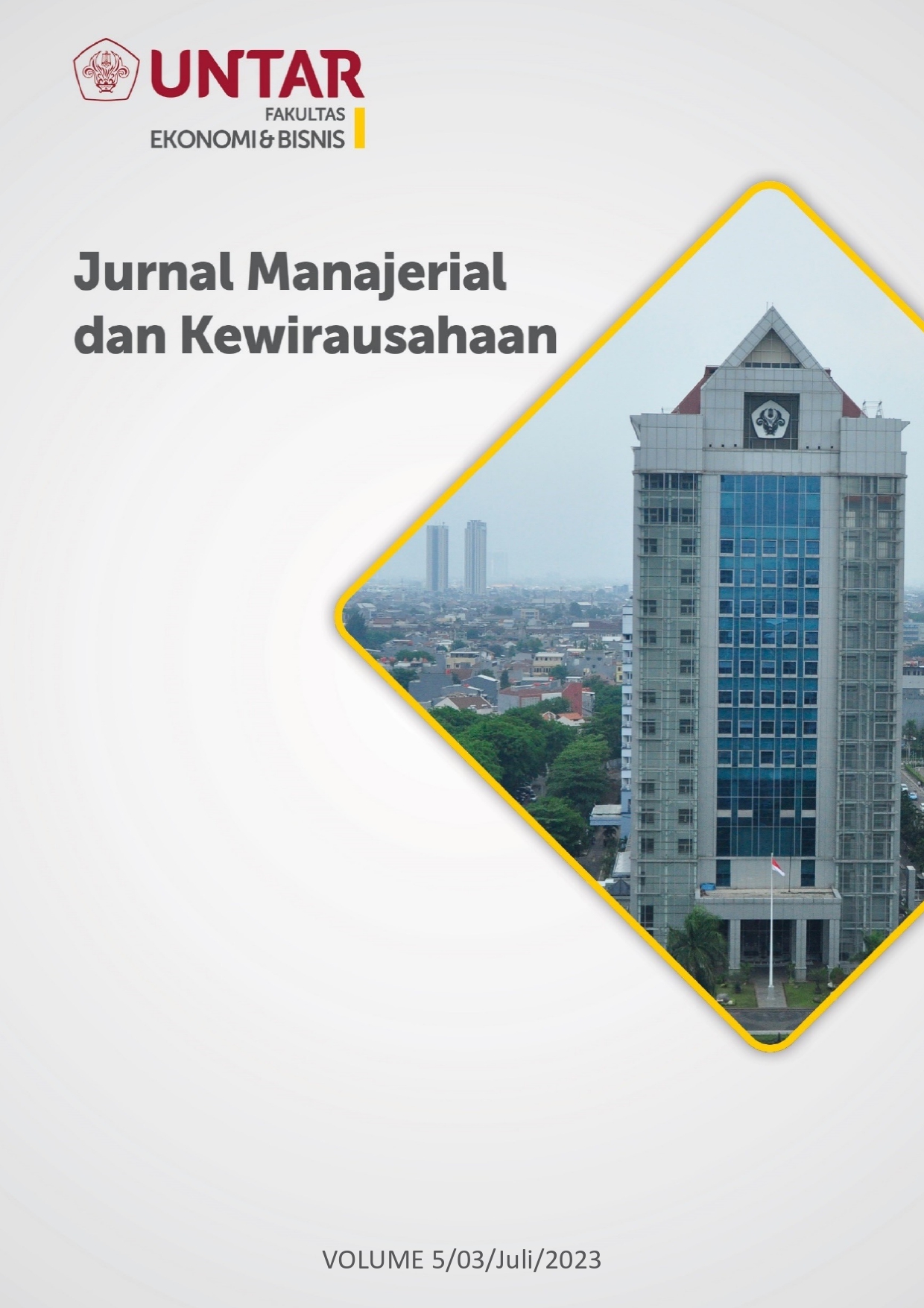Pengaruh Pembelajaran Organisasi dan Orientasi Kewirausahaan terhadap Kinerja UMKM Kuliner
Main Article Content
Abstract
In the era of globalization, competition between business actors, especially micro, small and medium enterprises (MSMEs) is unavoidable. MSMEs must identify several factors that can improve their business performance in order to adapt to an ever-changing environment. Improved performance of MSMEs is expected to significantly improve the nation's economy as a whole. The purpose of this study was to find out whether organizational learning and entrepreneurial orientation have an influence on the performance of culinary MSMEs. The method used in this research is quantitative research, with the research design used in this research is experimental or causal research. The number of samples used in this study were 80 respondents from culinary MSME owners in West Jakarta. The sampling technique used was non-probability sampling with purposive sampling. Data collection was carried out using a Likert scale questionnaire, processed using Smart Partial Least Square (PLS) software version 3. The results of this study are organizational learning that has a positive and significant influence on the performance of culinary MSMEs, and entrepreneurial orientation has a positive and significant influence on performance. Culinary SMEs. The author suggests that culinary MSMEs in West Jakarta continue to learn in order to be able to better face and defend their business against ever-evolving competition and apply innovation, have a more proactive and courageous behavior in taking risks to be maintained so that the performance of culinary MSMEs in West Jakarta can be better and increased business performance.
Article Details

This work is licensed under a Creative Commons Attribution-NonCommercial-ShareAlike 4.0 International License.
This work is licensed under a Jurnal Muara Ilmu Ekonomi dan Bisnis Creative Commons Attribution-ShareAlike 4.0 International License.,/p>
References
Aritonang R. L. R. (2007). Riset Pemasaran Teori dan Praktik. Bogor: Ghalia Indonesia.
Barney, J., & Clark, D. (2007). Resource-Based Theory Creating and Sustaining Competitive Advantages. Journal Of Public Affairs, 8(4), 316. doi:https://doi.org/10.1002/pa.303
Cho, Y. H., & Lee, J.-H. (2018). Entrepreneurial orientation,entrepreneurial education and performance. Asia Pacific Journal of Innovation and Entrepreneurshi, 12(2), 124-134. doi:http://dx.doi.org/10.1108/APJIE-05-2018-0028
Hair, J. F., Ringle, C. M., & Sarstedt, M. (2017). Partial Least Squares Structural Equation Modeling. Los Angeles, London, New Delhi, Singapore, washington DC, Melbourne: Sage. doi:http://dx.doi.org/10.1007/978-3-319-05542-8_15-1
Hendrawan, A. & Wijaya, A. (2020). Pengaruh Dimensi Orientasi Kewirausahaan dan Jaringan Usaha terhadap Kinerja Usaha UKM di Jakarta Barat. Jurnal Manajerial dan Kewirausahaan, 2(3), 577-586. https://doi.org/10.24912/jmk.v2i3.9569
Jain, A. K., & Moreno, A. (2015). Organizational learning, knowledge management practices and firm’s performance An empirical study of a heavy engineering firm in India. The Learning Organization, 22(1), 14-39. doi:https://doi.org/10.1108/TLO-05-2013-0024
Junel, J. A., Destiani, F., A. S., & Nugraha, D. (2022). Persepsi Wirausahawan Terhadap Perkembangan Usaha di Masa Pandemi Covid-19. Jurnal Ilmiah Keagamaan dan Kemasyarakatan, 16(5), 1752 - 1757. doi:10.35931/aq.v16i5.1161
Putri, B. M., Muhar, A. M., & Miraza, Z. (2022). Resource-based view strategy as a determinant of business performance moderated by market orientation in MSMEs culinary sector in Medan city. Jurnal Manajemen & Bisnis, 21(1), 48-60. doi:https://doi.org/10.24123/jmb.v21i1.570
Rafiki, A., Putra, N. M., Rossanty, Y., & Sari, P. B. (2021). Organizational learning of entrepreneurship orientation and personal values on the growth of Indonesian SMEs. Jurnal Manajemen Kebijakan Sains, 2053- 4620. http://dx.doi.org/10.1108/JSTPM-03-2020-0059
Ranto, D. W. (2016). Pengaruh Orientasi Kewirausahaan Terhadap Kinerja Umkm Bidang Kuliner di Yogyakarta. 3(2).
Sekaran, U., & Bougie, R. (2017). Metode Penelitian untuk Bisnis Pendekatan Pengembangan-Keahlian. Jakarta Selatan: Salemba Empat.
Sondra, T. C. & Widjaja, O. H. (2021). Pengaruh Orientasi Pasar, Orientasi Kewirausahaan dan Inovasi terhadap Kinerja Usaha UMKM Bidang Konveksi di Jakarta Barat. Jurnal Manajerial dan Kewirausahaan, 3(2), 500-508. https://doi.org/10.24912/jmk.v3i2.11897
Sugiyono. (2010). Metode Penelitian Pendidikan Pendekatan Kuantitatif, kualitatif, dan R&D. Bandung: Alfabeta.
Sugiyono. (2019). Statistika untuk Penelitian. Bandung: CV Alfabeta.
Utama, L. & Hartono, M. V. A. (2018). Pengaruh Sumber Daya Pemilik Waralaba terhadap Kinerja Penerima Waralaba dengan Orientasi Kewirausahaan sebagai Mediasi. Conference on Management and Behavioral Studies, 97-107.
Wahyuni, N. M., & Sara, I. M. (2020). The effect of entrepreneurial orientation variables on business performance in the SME industry context. Journal of Workplace Learning, 32(1), 35-62. doi:https://doi.org/10.1108/JWL-03-2019-0033
Wardi, Y., Susanto, P., & Abdullah, N. L. (2017). Orientasi Kewirausahaan pada Kinerja Usaha Kecil dan. Jurnal Manjemen Teknologi Menengah (UKM) Sumatera Barat: Analisis Peran Moderasi dari Intensitas Persaingan, Turbulensi Pasar dan Teknologi , 16(1), 46-61. doi:http://dx.doi.org/10.12695/jmt.2017.16.1.4
Wencang, Z., Huajing, H., & Xuli, S. (2015). Does Organizational Learning Lead to Higher Firm Performance? An Investigation of Chinese Listing Companies. The Learning Organization, 22(5), 271-288. doi:https://doi.org/10.1108/TLO-10-2012-0061



